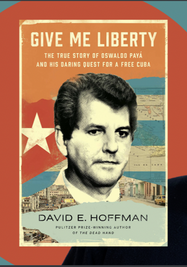Pulitzer Prize winning author David E. Hoffman has written a “riveting” biography of leading dissident Oswaldo Payá – ‘Cuba’s Vaclav Havel’ – whose Varela Project defied Fidel Castro’s Communist regime, inspiring thousands of Cubans to demand freedom and democracy.
This is the story of one man’s struggle against totalitarian rule, says Hoffman. Throughout Cuba’s volatile history, people have risen to demand the right to rule themselves freely, he writes for The Post:
They were dreamers who dared to wish for more, whose visions were often cut short, whose pursuit of liberty was often lost and then resurrected again by a new generation. Oswaldo Payá inherited those dreams and turned them into action with the Varela Project. He knew how basic rights were trampled upon in Cuba and set out, against great odds, to do something about it.
 “Give me Liberty” portrays the journey of Payá from a rebellious teenager who was sent to a work camp for his Catholic beliefs to a member of the Church who tried to push it to become more vocal in advocating for the rights of Cubans, eventually realizing that he needed to step into politics, even if that meant going against the repressive machinery of the Cuban state — and paying a high price for it, The Miami Herald reports. The book “has been a dream for a long time,” said his daughter Rosa María Payá, herself a prominent advocate for political liberties in Cuba after being forced into exile after her father’s death.
“Give me Liberty” portrays the journey of Payá from a rebellious teenager who was sent to a work camp for his Catholic beliefs to a member of the Church who tried to push it to become more vocal in advocating for the rights of Cubans, eventually realizing that he needed to step into politics, even if that meant going against the repressive machinery of the Cuban state — and paying a high price for it, The Miami Herald reports. The book “has been a dream for a long time,” said his daughter Rosa María Payá, herself a prominent advocate for political liberties in Cuba after being forced into exile after her father’s death.
“To me, it’s an endless fascination how one person can tackle a big totalitarian system that way,” said Hoffman, who has written books on the Soviet Union. “What does it take?”
Hoffman also examines the uneasy relationship between Payá and Miami’s Cuban exile community — which initially distrusted Payá’s effort to confront the Cuban regime through legal means rather than exile-led insurrection, WLRN’s Tim Padgett adds.
“Oswaldo’s lesson is that Cubans have to change Cuba themselves,” Hoffman said. “This is not going to be something to come from the United States; it’s not going to come from elsewhere. It has to come from within.”







